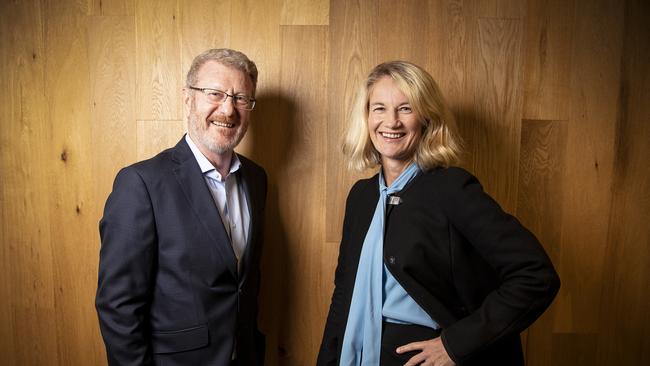Merger of First State Super and VicSuper to create second biggest profit-for-members fund
The merger of two public sector default funds will create a super major to rival AustralianSuper.

Australia’s second biggest profit-for-members super fund is set to emerge next year after the Victorian and NSW public sector default funds struck a deal they claim will enhance returns, reduce fees and advice options for more than 1.1 million members.
Top-rated First State Super and VicSuper have started due diligence on a merger that would create a $120 billion fund — second only to the $155bn AustralianSuper — from July next year.
First State Super with $98bn under management is set to claim the chairman and CEO roles as well as a majority of the board after the two funds signed a binding heads of agreement to merge their funds.
The merged fund would overtake QSuper — the Queensland public sector fund — as the second largest fund in the country and open options to trim costs and broaden investment portfolios.
Chief executive of First State Super Deanne Stewart said the merged entity would be the pre-eminent fund for retirement and advice, with as much as 25 per cent of members in the draw down phase.
“The merger business case has confirmed there is strong alignment between our funds and we’re confident we could generate significant benefits for our combined membership.”
First State has been a serial acquirer, buying the advice business StatePlus in 2016 to add another $21 billion in funds to its tally and expand its advice network to 200. It took over Victoria based Health Super in 2011. Ms Stewart would become CEO of the merged fund, while First State chairman Neil Cochrane would preside over a board that would expand to 15 as the merger is implemented.
It would contract to 10 directors by 2022.
VicSuper CEO Michael Dundon would continue with the merged fund to help with integration
He said the merger would open up investment options that had not been previously available to the $22 billion fund, including the potential to bring some investment management services in house, and larger direct investments such as First State’s purchase last year of the Victorian Land Titles office for $2.7bn.
Both funds, which cover public servants teachers, healthcare workers and emergency services, skew heavily in favour of women at around two thirds of the combined funds’ members.
Ms Stewart said the proportion of members in pension phase highlighted the need for a strong advice channel within the fund.




To join the conversation, please log in. Don't have an account? Register
Join the conversation, you are commenting as Logout